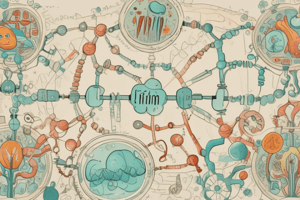Podcast
Questions and Answers
What is the primary function of the transamination reaction in metabolism?
What is the primary function of the transamination reaction in metabolism?
- Oxidation of ketoacids directly for energy
- Synthesis and degradation of amino acids (correct)
- Oxidation of amino acids
- Synthesis of erythrocytes
Which tissue contains the highest concentration of AST?
Which tissue contains the highest concentration of AST?
- Kidney
- Cardiac tissue (correct)
- Skeletal muscle
- Pancreas
What is the normal level of serum ALT in IU/L?
What is the normal level of serum ALT in IU/L?
- 30 IU/L
- 20 IU/L
- 10 IU/L
- 15 IU/L (correct)
Which enzyme is primarily used for early detection of liver disease?
Which enzyme is primarily used for early detection of liver disease?
Where are the smallest amounts of GPT (ALT) found in the body?
Where are the smallest amounts of GPT (ALT) found in the body?
What role does the tricarboxylic acid cycle play in relation to ketoacids formed by transamination?
What role does the tricarboxylic acid cycle play in relation to ketoacids formed by transamination?
Flashcards are hidden until you start studying
Study Notes
The Transamination Reaction
- The transamination reaction plays a crucial role in intermediary metabolism, facilitating the synthesis and degradation of amino acids.
- The reaction produces ketoacids, which are ultimately oxidized by the tricarboxylic acid cycle to provide a source of energy.
Tissue Source of AST
- AST is widely distributed in human tissue.
- The highest concentrations of AST are found in cardiac tissue, liver, and skeletal muscle.
- Smaller amounts of AST are found in the kidney, pancreas, and erythrocytes.
Clinical Significance
- Normal serum AST levels are up to 20 IU/L.
- Normal serum ALT levels are up to 15 IU/L.
- ALT (GPT) is primarily found in liver and kidney cells, with smaller amounts in the heart and muscles.
- Normally, ALT levels in blood are low, but when the liver is damaged, ALT is released into the blood, causing levels to increase.
- The ALT blood test is useful for early detection of liver disease.
Studying That Suits You
Use AI to generate personalized quizzes and flashcards to suit your learning preferences.




